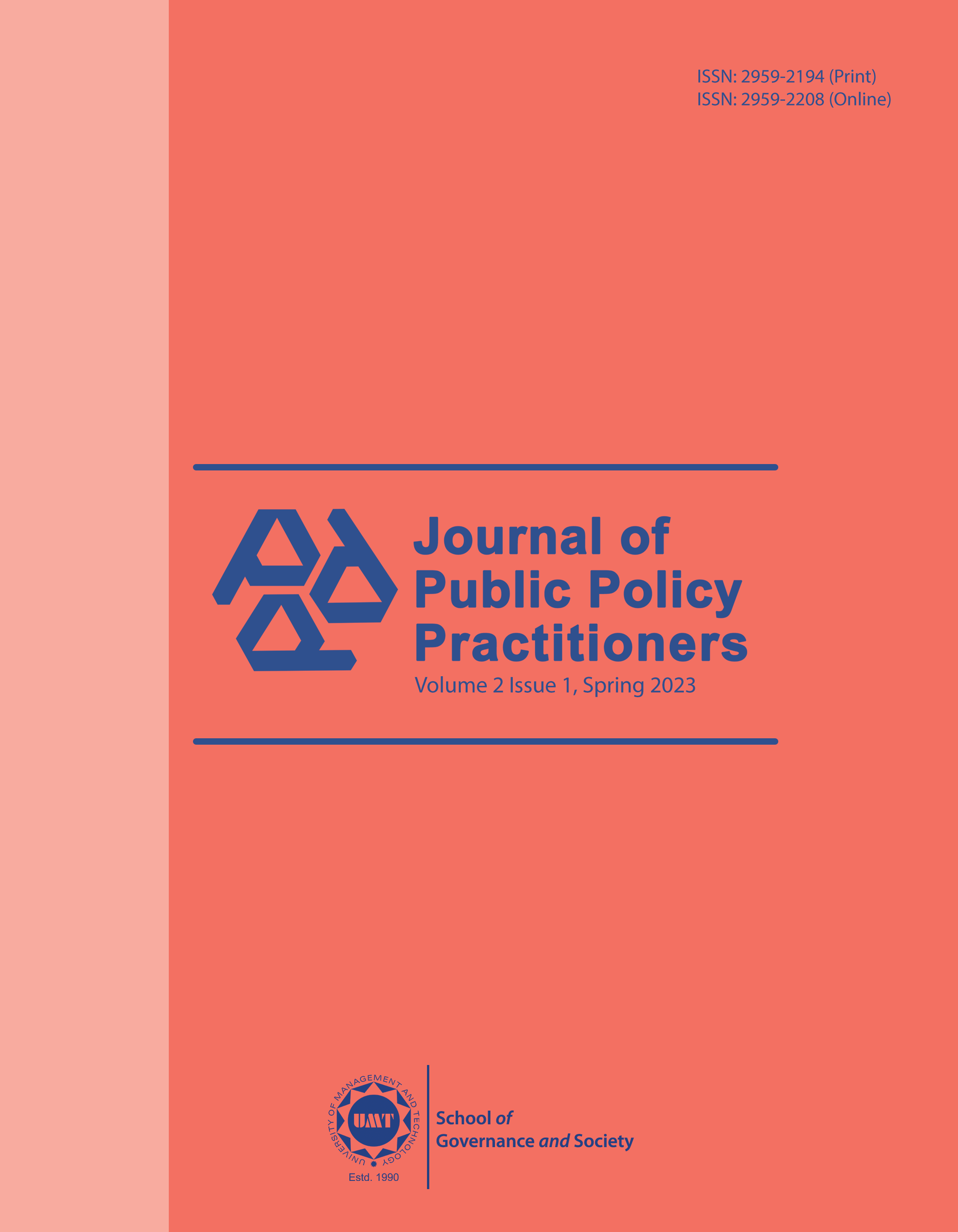Low-Tax to GDP Ratio: Causes and Recommendations
Abstract
 Abstract Views: 0
Abstract Views: 0
Tax to GDP reflects the Governments revenue collection through control over all the gross productivity of the nation. The present study highlights the causes of lack of resources for economic development of the country. It further suggests evidence-based policy for Pakistan to make it an industrialized and developed economy by 2025. Secondary data were used to conduct this research. The research found that lack of Political will, the rule of few through exclusion, biased and nepotism in legal & institutional environment like SROs in finance, industry and FBR, are the main causes of low tax to GDP ratio. The study concluded that Pakistan needs to improve its regime of tax collection for one-point agenda of leaving no income untaxed in the country. It should also focus on eliminating exemptions.
Downloads
References
ARY News. (2022, May 31). FBR releases tax collection details for 2021-22. https://arynews.tv/fbr-releases-tax-collections-details-for-2021-22/
Burki, S. J. (2007). Pakistan’s economy: Its performance, present situation and prospects. Nonproliferation Policy Education Center. https://npolicy.org/files/20090813-Burki%20final.pdf
CEIC. (2022). Pakistan tax revenue: % of GDP, 2000 – 2023. https://www.ceicdata.com/en/indicator/pakistan/tax-revenue--of-gdp
Chaudhry, I. S., & Munir, F. (2010). Determinants of low tax revenue in Pakistan. Pakistan Journal of Social Sciences, 30(2), 439–452.
Government of Pakistan. (2008). Fiscal policy statement 2007-08. https://www.finance.gov.pk/publications/Fiscal%20Policy%20Statement.pdf
Haq, M. (1961). Deficit financing in Pakistan. Institute of Development economics.
Hussain, I. (2004). Economy of Pakistan - past, present and future. Bank of International Settlements. https://www.bis.org/review/r040216c.pdf
International Growth Centre. (2023, April 19). Why does Pakistan tax so little? https://www.theigc.org/blogs/taxing-effectively/why-does-pakistan-tax-so-little
Kagan, J. (2023, October 12). What is the tax-to-GDP ratio? what is a good one? Investopedia. https://www.investopedia.com/terms/t/tax-to-gdp-ratio.asp
Kemal, M. A., & Qasim, A. W. (2012). Precise estimates of the unrecorded economy. The Pakistan Development Review, 51(4), 505–516.
Khan, M. T. I., Anwar, S., Sarkodie, S. A., Yaseen, M. R., & Nadeem, A. M. (2023). Do natural disasters affect economic growth? The role of human capital, foreign direct investment, and infrastructure dynamics. Heliyon, 9(1), Article e12911.
Lewis, S. R., Jr. (1984). Taxation for development: principles and applications. Oxford University Press.
Maheshwari, R. (2023, June 14). Difference between direct and indirect tax. Forbes. https://www.forbes.com/advisor/in/tax/difference-between-direct-and-indirect-tax/#:~:text=Direct%20taxes%20are%20paid%20directly,purchases%20of%20goods%20and%20services
McCartney, M., & Zaidi, S. A. (Eds.). (2019). New perspectives on Pakistan's political economy: state, class and social change (Vol. 9). Cambridge University Press.
Rana, S. (2010, December 25). Last-ditch attempt: Govt to accept opposition demands for imposing GST. The Express Tribune. https://tribune.com.pk/story/94642/last-ditch-attempt-govt-to-accept-opposition-demands-for-imposing-gst
Schwab, K. (2013). The global competitiveness report 2013–2014. World Economic Forum. https://www3.weforum.org/docs/WEF_GlobalCompetitivenessReport_2013-14.pdf
Sustainable Development Policy Institute. (2013). Draft study: Reforming tax system in Pakistan. https://sdpi.org/sdpiweb/publications/files/Draft%20Study-%20Reforming%20Tax%20System%20in%20Pakistan.pdf
The World Bank. (2013). Doing business 2013: Smarter regulations for small and medium-size enterprise. https://www.doingbusiness.org/content/dam/doingBusiness/media/Annual-Reports/English/DB13-full-report.pdf
The World Bank. (n.d.). Low & middle income. https://data.worldbank.org/country/XO
Zahoor, M. A. (2018). History and politics of land reforms in Pakistan: A case study of Zulfikar Ali Bhutto Era. Journal of the Punjab University Historical Society, 31(2), 115–125.
Copyright (c) 2023 Azhar Rashid Khan

This work is licensed under a Creative Commons Attribution 4.0 International License.







